14–15 Oct 2024
International Conference in Halle
Modern Housing postwar – Cities of Tomorrow?
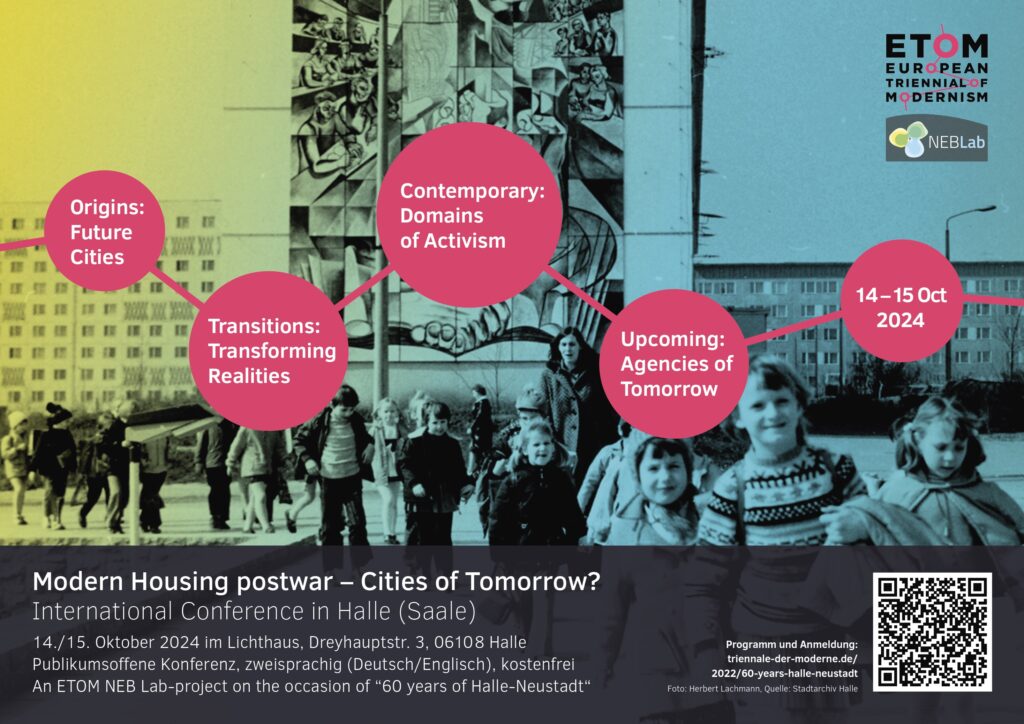
International conference
on the occasion of “60 years of Halle-Neustadt” – an ETOM NEB Lab Milestone-Conference in the framework of the “New European Bauhaus” with focus on Central Europe, in the 20th anniversary year of the first EU expansion 2004 and with a Special Focus on the Polish-German exchange.
Sub-Pages
Sections • Speakers • Press-Downloads
Internal Links
DAY-I • DAY-II • TOURS • SPEAKERS • PARTNERS • OTHER EVENTS • REGISTRATION
An European Triennial of Modernism (ETOM) NEB milestone project about large housing estates in Central Europe erected after World War II. The conference is carried out as an “ETOM NEB-Lab” conference, within the framework of the “New European Bauhaus”, in the context of Central Europe and, in the 20th anniversary year of the first EU expansion 2004, with a special focus on the exchange with Poland — In cooperation with the Federal Ministry for Housing, Urban Development and Building (BMWSB), the State of Saxony-Anhalt – Ministry for Infrastructure and Digital Affairs and the State Chancellery and Ministry for Culture, and the City of Halle (Saale).
The conference will be hosted at
- Lichthaus Halle (Dreyhauptstrasse 3, 06108 Halle)
[near the market square and Hallmarkt – see Google-Map] - The conference will include two excursion days on 13 + 16 Oct through the residential development in Halle-Neustadt and a short walk to the Franckesche Stiftungen nearby on 14 Oct.
- Anmerkung zur Sprache: Die Konferenzsprache ist wegen des länderübergreifenden Themas Englisch. Es wird eine Simultan-Übersetzung angeboten, so dass Impulse sowie Diskussionsbeiträge auch auf Deutsch formuliert werden können und eine breite Beteiligung möglich ist.
- Note on language: The conference language is English due to the transnational agenda. To enable the broadest possible participation, simultaneous translation will be provided – so that individual contributions to the discussion can also be presented and/or formulated in German.
- Registration is required via Eventbrite …
VIDEO-DOCUMENTATION
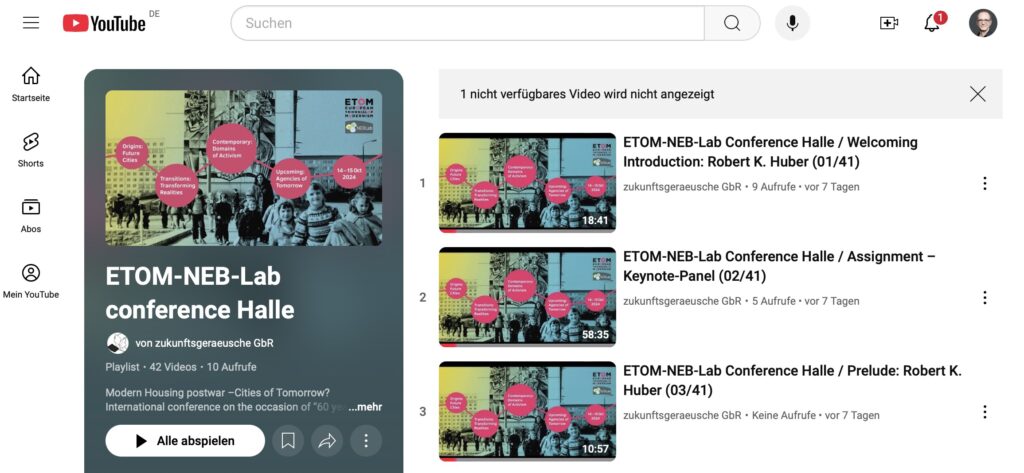
Program Schedule
Conference DAY 1
Mon – Oct 14, 2024
08:00 Registration openat conference venue:
Lichthaus Halle (Dreyhauptstrasse 3, 06108 Halle)
[near: market square and Hallmarkt – Google-Map]
08:30 Visit of Franckesche Stiftungen (Franckeplatz 1, Haus 37, 06110 Halle – see Google Map), guided by Thomas Grunewald, Franckesche Stiftungen with a panoramic view over Halle and Halle-Neustadt – transfer back to Lichthaus
09:45 Welcoming at Lichthaus
- Introduction by Robert K. Huber,
ETOM NEB Lab, zukunftsgeraeusche
10.00 Assignment – Keynote-Panel:
- Klara Geywitz, German Federal Minister for Housing, Urban Development and Building (BMWSB)
- Mario Kremling, Director Sachsen-Anhaltische Landesentwicklungsgesellschaft (SALEG)
- René Rebenstorf, Deputy Mayor for Urban Development and Environment, City of Halle (Saale)
- Hanna Radziejowska, Director Pilecki-Institute Berlin
- had to cancel on short notice: Vera Winthagen,
New European Bauhaus, Joint Research Center of the European Commission - Moderators: Riin Atalu, ICOMOS;
Uta Pottgiesser, DOCOMOMO International;
Robert K. Huber, zukunftsgeraeusche
——— 11:00 Coffee-Break ———
11:15 Prelude
Previous lessons and introduction to Halle / Halle-Neustadt
- Uta Pottgiesser, DOCMOMO International – Lessons Learned:
Annual conference of DOCOMOMO Germany and the „Frankfurt Declaration of Housing“ - Harald Kegler, University Halle: Introduction about Halle-Neustadt
——— 12:00 Lunch-Break ———
13:00 Section 1:
Origins | Future Cities – emerging futures
The title of this section refers to the “historical future designs” and “projected futures” that are related to the urban planning designs and large-scale housing concepts of post-WWII Modernism. The subject of the first section is the investigation of these origins, based on the qualities and weaknesses of these future concepts of the time and their implementation, with a view to understanding the causes and backgrounds on the one hand and from today’s perspective on the other. The topic and examination make use of reference examples, particularly in a Central European comparison, with the urban planning, architectural, housing, transport, cultural and social concepts and implementations being considered as contextually as possible. [More Info]
- Impulse-statements
- Helena Huber-Doudová, ETOM NEB Lab / National Gallery Prague
- Michał Wisniewski, ICC Krakow
- Svitlana Smolenska, div. universities (Ukraine / Germany)
- Verica Krstic, University of Belgrade
- Gergely Hartmann, University of Győr, Moholy-Nagy University of Art and Design (MOME), Budapest / „ModernGyőr Project“
- Mykola Bevz, Lviv Polytechnic University
- had to cancel on short notice: Hana Řepková,
National Monument Institute, Prague - had to cancel at short notice: Thomas Flierl,
Architectural Historian, Max-Lingner Foundation, Berlin - Workshop-Talk / workshop discussions (incl. short break)
Moderators: Uta Pottgiesser, DOCMOMO International;
Helena Huber-Doudová, ETOM NEB Lab / National Gallery Prague - Lessons learned – Question:
What do we inherit from “historic futures”, positive/negative legacy?
——— 15:15 Coffee-Break ———
15:30 Section 2:
Transitions | Transforming Realities – alterations of decline and renewal
Section two deals with the comprehensive changes, including the political, societal, and economic circumstances – structural changes – in the transition period after the fall of the so-called Iron Curtain as well as the concrete urban development changes and especially urban redevelopment programs of this period. By introducing reference examples, particularly in an Central European comparison the section focusses a holistic and analytical view of the reasons and critical aspects of why and how changes and (re)development programs have been elaborated and implemented. [More Info]
- Impulse-statements
- Hubert Trammer, ETOM NEB Lab / New European Bauhaus – High-Level Roundtable
- Peter Szalay, Slovak Academy of Sciences
- Tinatin Gurgenidze, Tbilisi Architecture Biennal
- Hanna Bondar, Member of the Ukrainian Parliament
- Regina Balla, Budapest University of Technology and Economics
- Guido Schwarzendahl, Cooperative Housing International / Bauverein Halle & Leuna
- Workshop-Talk / workshop discussions (incl. short break)
Moderators: Eszter Dávida, ETOM NEB Lab / KÉK – The Hungarian Contemporary Architecture Center / New European Bauhaus – High-Level Roundtable; János Klaniczay, ETOM NEB Lab / KÉK – The Hungarian Contemporary Architecture Center - Breakout-Rooms (plus audience):
Learning about diverse realms and realities of transformation - Lessons learned – Question:
What crucial abilities can we derive for sustainable transformations?
——— 18:30 Late-Break (with snacks) ———
19:00 Keynote 1
- Joanna Kusiak, University of Cambridge / SFB 294 „Strukturwandel des Eigentums“
- Discussion (amongst keynote speakers + audience participation)
20:30 Reception (Get-together)
Conference DAY 2
Tue – Oct 15, 2024
08:30 Registration (for arrivals on day 2)
09:30 Welcoming Day 2
Interlude – Introduction to Halle / Halle-Neustadt
- Henry Marten, Lichthaus Halle / aufblick gGmbH
- Christian Drobe, Masaryk University, Brno / Exhibition „Nach den Maschinen“, Salinemuseum Halle
10:00 Section 3:
Contemporary | Domains of Activism – her/histories of activism
The title of section three refers to the respective contemporary or up-to-date approaches to activist engagement or its respective “her/histories”. The notion of activism incorporates activist approaches from the period before the fall of the so-called Iron Curtain, for example in terms of preservation and cautious or protective urban renewal, until previous or today’s forms of activist engagement that originate from the post-1989 transition. The section title “Contemporary” reflects on these notions, delving into the current approaches to activist engagement and each of their her/histories of these once contemporary “eras”.
The focus is on civic society engagement in the transition period; while Halle-Neustadt in particular represents a significant example of activist-driven development and – now – her/history in this regard. The impulse contributions and international examples again foster the Central European comparison. [More Info]
- Impulse-statements
- Barbara Szij, KÉK – The Hungarian Contemporary Architecture Center
- Saimir Kristo, Universiteti Barleti, Tirana / Tirana Architecture Triennale
- Zofia Piotrowska, WSPÓŁ Association for Housing / RZUT Quarterly
- Alex Axinte, Studio Basar, Bucharest
- Polina Ljaševa, „Lasnaidee“ – community movement in Lasnamäe housing area
- Barbara Engel, KIT Karlsruhe
- had to cancel on short notice: Agata Twardoch
- Workshop-Talk / workshop discussions (incl. short break)
Moderators: Klára Prešnajderová, ETOM NEB Lab / Slovak Design Center; Kacper Kępiński, NIAiU – National Institute of Architecture and Urban Planning, Warsaw - Lessons learned – Question:
How or how long can temporary achievements maintain permanent?
——— 12:30 Lunch-Break ———
13:30 Section 4:
Upcoming | Agencies of Tomorrow – local and planetary challenges
The topic of the last section deals with future prospects, based on current and future development and policy goals, including a comparison of local future concepts and urban development agendas across Central European cities, taking into account exemplary local and overarching, European and global framework conditions and objectives. [More Info]
- Impulse-statements
- Ruta Leitanaite, ETOM NEB Lab / Architects‘ Council of Europe / UREHERIT program
- Monika Konrad, City of Warsaw, Department of Architecture and Spatial Planning – Deputy Director / Brno Technical University
- Zoltán Erő, City of Budapest – Chief Architect
- Yvette Vašourková, CCEA – Center for Central European Architecture
- Bernd Hunger, Competence Center for Large Housing Estates
- Ulrich Möbius, Project „Gemeinschaftsamt – ex Stasi Areal Halle“
- Workshop-Talk / workshop discussions (incl. short break)
Moderators: Ruta Leitanaite, ETOM NEB Lab / Architects‘ Council of Europe / Architects Association of Lithuania; Robert K. Huber, ETOM NEB Lab / BHROX bauhaus reuse / zukunftsgeraeusche - Breakout-Rooms (plus audience):
Exploring emergences of present chances and challenges - Lessons learned – Question:
How can we pursue/sustain (trans-sectoral) agencies for a better future?
——— 16:30 Late-Break ———
17:00 Keynote 2
- Lenka Burgerova, Prague 7 – deputy mayor / Technical University of Liberec / Technical University Prague
- Discussion (amongst keynote speakers + audience participation)
18:30 Closing panel – Final lessons:
Sketching big points of postwar modern housing for tomorrow
As the closing round of discussion, the “final lessons” initially serve to bring together the “lessons learned” from the four topic sections, as well as takeaways from the keynote lectures, and reflect and summarize on them in interrelation. Building on this, the objective of “Sketching big points of postwar modern housing for tomorrow” should ideally be to summarize overarching big points for recommendations, ideas for strategies, or measures that can have a significant positive influence on the future sustainable development of urban design and large-scale housing construction of post-1945 Modernism.
- Nataliia Mysak, ETOM NEB Lab / Spatial Practice Lab, Lviv
- Marlena Happach, Poland National Institute of Heritage
- Lenka Burgerova, Prague 7 – deputy mayor
- plus further speakers of the conference
- had to cancel on short notice: Agata Twardoch,
Silesian University of Technology, Gliwice
20:00 End
Moderation
General Moderators
- Robert K. Huber, ETOM, BHROX Bauhaus reuse, zukunftsgeraeusche GbR, Triennale der Moderne
- Ben Buschfeld, ETOM, buschfeld.com, Tautes Heim, Triennale der Moderne
- Uta Pottgiesser, ETOM, DOCOMOMO International
- Riin Alatalu, ETOM, ICOMOS International
- Wido Quist, ETOM, DOCOMOMO International
- Roman Hillmann, ETOM, ICOMOS Germany
Section Hosts (in order of sections 1–4)
- Eszter Dávida, ETOM, KEK, New European Bauhaus Round Table
János Klaniczay, ETOM, KEK – Hungarian Contemporary Architecture Center - Klára Prešnajderová, ETOM, Slovak Design Center
Kacper Kępiński, NIAiU – National Institute of Architecture and Urban Planning, Warsaw - Ruta Leitanaite, ETOM, Architects Association of Lithuania
Robert K. Huber, ETOM, BHROX Bauhaus reuse, zukunftsgeraeusche GbR - Uta Pottgiesser, ETOM, DOCOMOMO International
Helena Huber-Doudová, ETOM, National Gallery Prague- had to cancel on short notice: Thomas Flierl,
Architectural Historian, Max-Lingner Foundation
- had to cancel on short notice: Thomas Flierl,
Speakers and Panelists
for the complete list of speakers and panelists see the according
Pre-/Post-Conference
Tours and Excursions 13 + 16 Oct
- Sunday, 13 Oct, 16:30–18:30:
Pre Conference Tour through Halle-Neustadt
with Harald Kegler and Roman Hillmann
Starting point: Neustädter Passage 15, 06122 Halle-Neustadt (former town hall of Halle-Neustadt now serving as the „Landesamt für Vermessung und Geoinformation“, located near S-Bahn station „Neustadt“ [Google Maps] - Wednesday 16 Oct:
Post Conference Tours in/around Halle-Neustadt- 09:00–10:15, Gemeinschaftsamt – Transformation of the former Stasi site in Halle-Neustadt;
guided tour with Ulrich Möbius, Gemeinschaftsamt
meeting point: Front of former Stasi Areal in Halle-Neustadt Gimritzer Damm / Selkestraße [Google-Map] - 10:30–11:45: photo exhibition „Nach den Maschinen“, about industrial sites in Sachsen-Anhalt, guided tour with curator Christian Drobe; meeting point: Salinemuseum Halle, Mansfelder Strasse 52, 06108 Halle, exhibition entry at the Großsiedehalle [Google-Map] (displayed until 15 Dec 2024)
- 12:00–13:00: exhibition „Und nacher noch ins Prisma“, displaying photos and objects of/in Halle-Neustadt
at: Stadtmuseum Halle, Große Märkerstrasse 10, 06108 Halle [Google-Map] (displayed until 29 Jun 2022)
- 09:00–10:15, Gemeinschaftsamt – Transformation of the former Stasi site in Halle-Neustadt;
- Registration for all tours and events is required via Eventbrite
Press Announcement
[also applicable for co-promotion]
14 + 15 Oct 2024
International Conference in Halle (Saale)
“MODERN HOUSING POSTWAR – CITIES OF TOMORROW?”
The conference “Modern Housing Postwar – Cities of Tomorrow?” in Halle an der Saale, Germany is dedicated to post-war modernist housing in Central Europe. It will take place on October 14-15 taking the anniversary of “60 years of Halle-Neustadt” as an opportunity to place the topic of the transformation of large-scale post-war modernist urban development in a trans-European context.
Together with stakeholders from various Central European countries – civil society, authorities and institutions – specific experiences, challenges and examples of good practice will be presented and discussed to show how the large-scale housing estates of modernism after World War II can be qualified and further developed today. Before and after the conference, guided tours of the Halle-Neustadt area will be offered on October 13 and 16.
The conference arose from the initiative of a “European Triennial of Modernism” and is being held as part of the “New European Bauhaus” as a transnational “ETOM NEB Lab” with over 40 partners from 15 countries.
A special focus is on the exchange with Poland and the special experiences in housing and urban development after the fall of the Iron Curtain in the countries of Central Europe. The conference is organized in cooperation with the BMWSB – Federal Ministry of Housing, Urban Development and Building, the State of Saxony-Anhalt – Ministry of Infrastructure and Digital Affairs and State Chancellery and Ministry of Culture – and the City of Halle (Saale) as well as the Foundation for German-Polish Cooperation.
The conference’s language will be English. Simultaneous translation between German and English is planned. The conference is free of charge. Participation is open to all interested parties – such as local initiatives, residents, experts and students from various disciplines.
Program and Updates
https://triennale-der-moderne.de/2022/press-download-60-jahre-halle-neustadt/
Visuals and Images
triennale-der-moderne.de/2022/press-download-60-jahre-halle-neustadt/
Press Announcement (Short Version)
14 + 15 Oct 2024: International Conference in Halle (Saale)
“MODERN HOUSING POSTWAR – CITIES OF TOMORROW?”
The ETOM NEB Lab milestone conference in Halle, Germany is dedicated to post-war modernist housing in Central Europe. It is part of the „New European Bauhaus“ and will take place on October 14-15 – taking the anniversary of “60 years of Halle-Neustadt” as an opportunity to place the topic of the transformation of large-scale post-war modernist urban development in a trans-European context.
Suggested Hashtags for Social Media
#NewEuropeanBauhaus #triennaledermoderne #triennialofmodernism #halleneustadt #nachkriegsmoderne #wohnungsbau #postwarmodernsim #housingestates #residentialarchitecture #ETOM #etom_neb_lab
Topic Outline
Trans-European findings and approaches about the developments and perspectives of the transformation of urban design and large housing settlements of post-war Modernism, from the 20th to the 21st century, considering major development and policy goals: transformability of inhabited stock and modern heritage, resilience and sustainability of urban (re)development, infrastructure, energy and building materials, and social cohesion.
The development of housing settlements and urban planning of post-war modernism embodies a multi-layered transformation – in dealing with scarcity, newness, change, existing built fabric and future tasks – which is significant in the European context, especially in the Central European countries along the former Iron Curtain, in order to learn from the history of development and sustainably open up future perspectives.
The emergence of the residential quarters and cities of tomorrow followed the housing shortage after World War II and was based on the critical approach and innovation represented by modern housing construction of the interwar period. The upcoming genesis was driven by social and economic developments and the period of change after 1989, with phases of transition, decline, civil society activism, urban redevelopment, renovation, renewal, and as well preservation. This development from the turn of the millennium to present day shapes the form, perception, and function as a built environment and living space for millions of people. In every respect, the crucial examination is on current transformations, resilience, and future capabilities in the face of structural change, demographics, the climate crisis, housing shortages, and social challenges.
Stay tuned via Social Media
Apart from the main festival season the website www.triennale-der-moderne.de is only updated occasionally. In the meanwhile, we keep you posted via our Social Media channels. If you want to help to spread the news, we will be happy to see your likes, shares and re-posts 🙂
- Event announced via Facebook
- Event announced via LinkedIn
as well as posts at - Facebook (#TriennaleDerModerne)
- Instagram (@triennale_der_moderne)
- Twitter (@TdModerne)
Sub-Pages
Cooperation partners / Supporters
- ETOM – European Triennial of Modernism
- ETOM NEB Lab –
represented by the Coordination Group:- BHROX bauhaus reuse / zukunftsgeraeusche
- KEK – Hungarian Contemporary Arch. Center
- ICOMOS international,
- NGP – National Gallery Prague
- SVK – Slovak Design Center
- EKA – Estonian Academy of Art,
- ACE – Architects’ Council of Europe
- buschfeld.com – graphic and interface design
- BMWSB – German Federal Ministry for Housing, Urban Development and Building
- State of Saxony-Anhalt – Ministry for Infrastructure and Digital Affairs and the State Chancellery and Ministry for Culture
- City of Halle (Saale)
- Foundation for Polish-German Cooperation
- Pilecki-Institute Berlin
- NIAiU – National Institute of Architecture and Urban Planning, Warsaw
- ICC – International Culture Center, Krakow
- SALEG – Landesentwicklungsgesellschaft
- Kompetenzzentrum Stadtumbau
- Zukunftszentrum für Deutsche Einheit und Europäische Transformation
- New European Bauhaus (NEB) at the European Commission
- ICOMOS international / Deutschland
- DOCOMOMO international
Curation and Organization
- Robert, K. Huber (1st curator)
- ETOM NEB Lab (co-curation)
- Ben Buschfeld (head of communication + design, co-curation)
- Peter Winter (technical head)
- Adelina Nicolaescu (office)
- Hilal Beratoglu (office)
Training Accreditation
The event is accredited as further training for members of the following architects chambers:
Co-promotion
[besides institutions above]
(via websites / newsletters / social media)
- Bundesstiftung Baukultur
- DOCOMOMO Deutschland
- Deutscher Werkbund Berlin
- BauNetz.de
- moderne-regional.de
- KulturerbeNetz.Berlin
- Zentrum für Baukultur Sachsen
- H-Soz-Kult
- Karlsruhe Institute of Technology
- Universität Münster
- SRL – Vereinigung für Stadt-, Regional und Landesplanung
- Deutsches Architektenblatt
- New European Bauhaus
- NEB Sachsen-Anhalt
- MID Sachsen-Anhalt
- Bauverein Halle-Leuna
- All-Events-in-Halle
- Competence Center for Large Housing Estates, Berlin
- Various group-posts (and reposts) on Facebook, LinkedIn, Instagram und X
- Radio feature by Deutschlandfunk
(incl. Interview with Klara Geywitz, German Federal Minister for Housing, Urban Development and Building as well as three other participants/organizers)
Corresponding
Partner Events in Poland and Germany
(related to the special focus and cooperation)
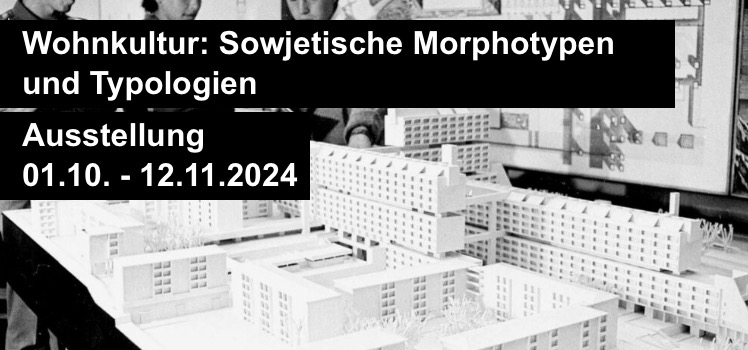
- Another ETOM milestone project:
cities | building | culture – built heritage in post-soviet urban development, 1 Oct – 12 Nov, BHROX bauhaus reuse – The exhibition in Berlin sheds light on Soviet housing heritage through plans and models that present a variety of urban and typological forms from twelve neighborhoods in post-soviet countries.

- 7th Heritage Forum of Central Europe – Conference „Responsibility & Renewal“, 04-05 Sep 2024, ICC, Krakow – The panels, lectures and discussions will focus onthe situation in Ukraine reflecting the The Hague Convention for the Protection of Cultural Property (1954) and the Venice Charter (1964).

- Exhibition „Socmodernism“, Opening 3 Oct 2024, until 19 Jan 2022, ICC, Krakow – the exhibition reveals the diversity of forms, authorships, technical and political connotations of Socialist Modernism in Central and Eastern Europe and reflects on how it has been (or can be preserved) today.

- Exhibition „Housing Product“, 15 Nov 2024 – 31 Jan 2022, Warsaw Architecture Pavilion ZODIAK – the program with exhibition, workshops, discussions and lectures will show the iterations of the housing system in Warsaw – from the communist period, to first market developments and financialization.
As well as …
- Warsaw under Construction – Festival, 25 Oct 2024, NIAiU, Warsaw
News & Updates - Inclusive Housing Studio – Exhibition, Opening (tba), NIAiU, Warsaw
News & Updates - Narracje Festival, 15-16 Nov 2024, NIAiU, Gdańsk
News & Updates - Residential Heritage: Soviet Morphotypes and Typologies – Exhibition by KIT / RWTH / GWZO and international partners,
Opening 01 Oct, until 12 Nov, BHROX, Berlin
News & Updates
Recommended Events
related to „60 years Halle-Neustadt“

- wohn_komplex, 12 – 15 Sep 2024, Halle-Neustadt – symposium in German with several workshops, exhibitions, guided tours and formats of activism
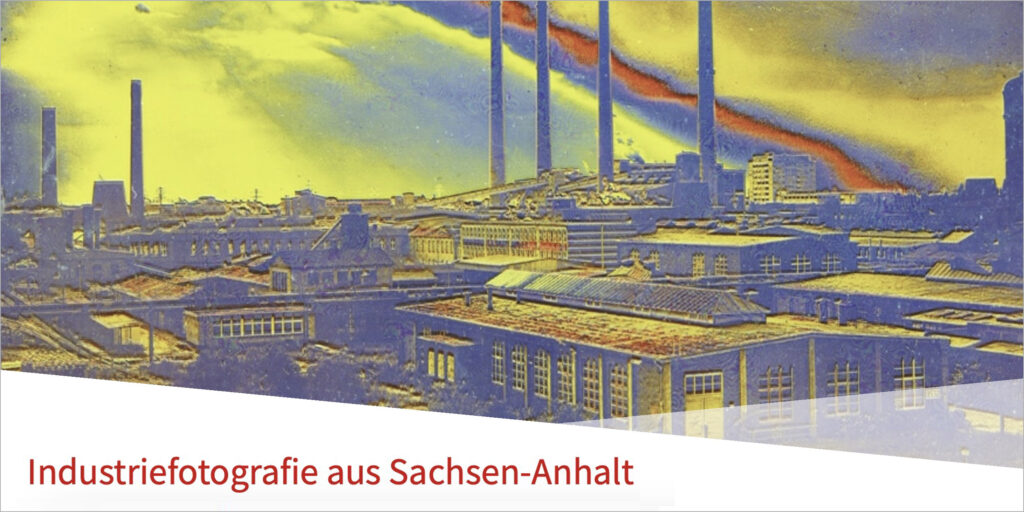
- photo exhibition „Nach den Maschinen“, about industrial sites in Sachsen-Anhalt – Salinemuseum Halle, Mansfelder Str. 52 (Thu-Sun, 10.00 – 17.00, until 15.12.2024)
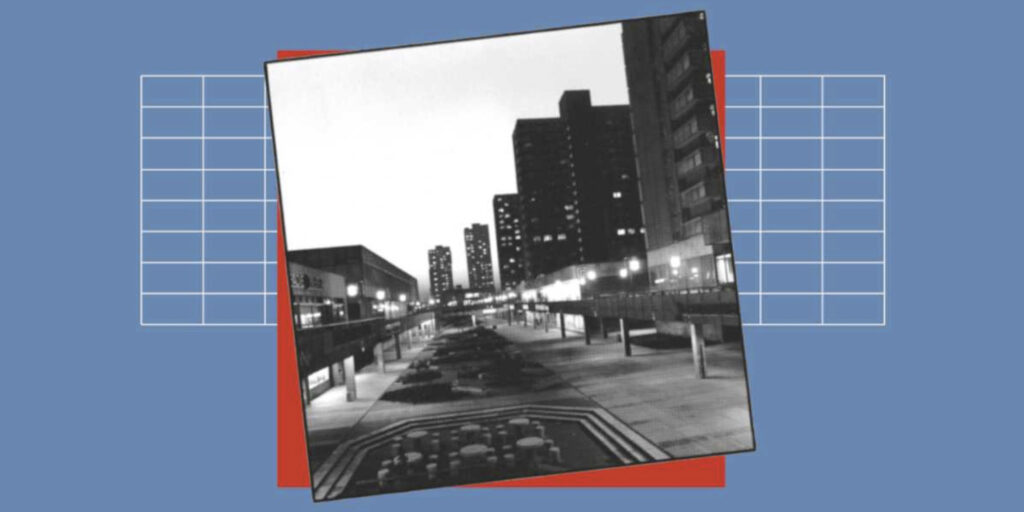
- exhibition „Und nacher noch ins Prisma“, displaying photos and objects of/in Halle-Neustadt – Stadtmuseum Halle, Große Märkerstr. 10 (Tue-Sun, 10.00 – 17.00, until 29.6.2022)
Back to top

Register Now

